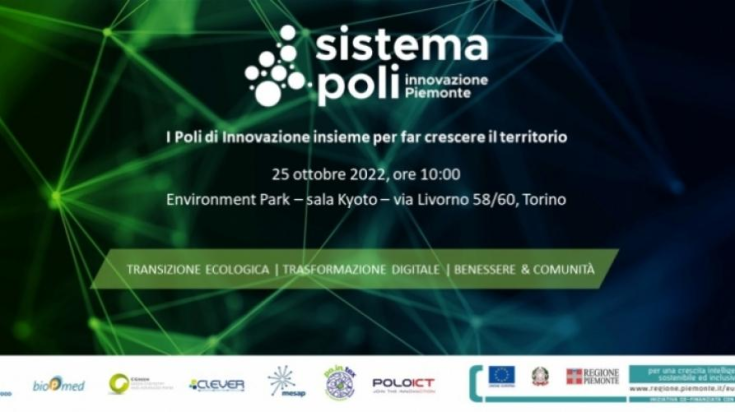Innovation clusters’ ecosystem of the Piedmont Region
On Tuesday 14th November at 1 pm, during the “Initiating Green Transformation for SMEs: Cases and Challenges” workshop held in Vienna by the Austrian partner – the promotional bank Austria Wirtschaftsservice – the coordinator entity of the Sistema Piemonte Poli presented its governance system as a Good Practice. Environment Park, the Torino Science and Technology Park, is also the managing entity of the Green energy and clean technologies Regional Cluster (CLEVER), together with Consorzio UN.I.VER.
The Metropolitan City of Turin involved the Environment Park to select one of their successful activities to be presented during the exchange of experience in Vienna, for their well recognised role in the Green transformation of regional and metropolitan SMEs. During a first small stakeholders’ meeting, the Metropolitan City of Turin decided to select the new governance of the Innovation clusters’ ecosystem of the Piedmont Region as the good practice to be presented in Vienna to Partners and Stakeholders.
Alexia Boulanger, Project manager at Environment Park, shared the Good Practice to partners and stakeholders during the third interregional meeting of the project: she presented very well the Piedmont Region Innovation Ecosystem as a “cluster of clusters”: the Piedmont Cluster System (Sistema Poli Piemonte) was launched on 25th October 2022 with the aim of enhancing the sectorial skills acquired since 2009 by the seven regional Clusters.
The new governance model envisages the duality of the clusters’ action both towards its own sector of specific interest and especially towards its own members and towards the 3 strategic Axes identified by the Piedmont Region, as a hole system.
The new governance model’s aim is to amplify knowledge and opportunities for the whole territory, by organising the Clusters’ activities around the three strategic axes selected by the Piedmont Region within the new S3. Two of the three Strategic Axes identified are indeed the ecological transition and the digital transformation of the companies and SMEs. The main aim of the Green Axe is looking for and disseminating the best green solutions for the benefit of companies and the regional territory as a whole; the objective of the Digital Axe is supporting the digital transformation of companies, helping them to become technologically smarter. The third strategic Axe identified by the Piedmont Region is “Well being and community”: its objective is to put health and food at the centre of innovation pathways, to foster the well-being of all regional communities.
The new governance model goes from a synergy model to a systematic one, through an agreement between the Clusters managing entities, because the main innovation trends do not only have a vertical thrust but must be followed with a transversal approach.
The new Innovation Cluster Ecosystem, therefore, serves the territorial development as a whole: the 7 Regional Clusters work together along the three cross-cutting components of innovation to strengthen the production system, to contribute to the sustainability and decarbonisation objectives set by the relevant regional policies, and to seize the opportunities that these processes entail in terms of technological responses and competitive advantage.
Sistema Poli Piemonte has four main objectives:
- to increase the impact of regional research and innovation policies for the benefit of the region;
- to foster the technology transfer for an increasingly smart region;
- to collaborate in synergy with the main stakeholders to accelerate the growth of the Piedmontese production ecosystem;
- to identify a common methodology aiming to systematise data and expertise to create more targeted and effective actions.
This new Innovation ecosystem model represents an innovative approach, since it means to contribute to the management of the innovation policies in line with the needs of the territory, to help to better disseminate opportunities by reaching out to new actors in different supply chains.
Finally, the revised cluster policy of the Piedmont Region and the creation of the Sistema Poli Piemonte is the action the Region took after the OECD Analysis titled “Regional Innovation
in Piedmont, Italy: from Innovation Environment to Innovation Ecosystem”. The OECD had indeed suggested to Piedmont’s policy makers that, in order to foster the regional innovation ecosystem, they needed to continue using clusters as drive of regional development, by strengthening the collaboration among the seven cluster management organisations and by promoting clusters as strategic intelligence hubs for the regional territory.
For any further information, please contact: [email protected]
